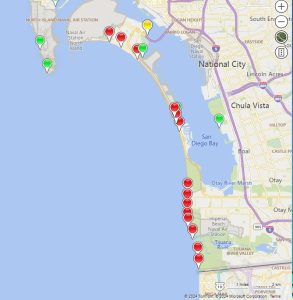Unified in the fight to end the escalating Tijuana River Valley environmental, public health, and economic crisis, South Bay leaders and stakeholders are urging the State of California to declare a State of Emergency and for the U.S. Centers for Disease Control to intervene and assist with monitoring and assessing residents’ health in affected communities.
 In a news conference held in Imperial Beach on June 4, Imperial Beach Mayor Paloma Aguirre, Port of San Diego Vice Chair Danielle Moore, Coronado Councilman John Duncan, Dr. Paula Stigler Granados with San Diego State University’s School of Public Health, and Lauren Cazares with the San Diego Regional Chamber of Commerce gathered to compel state and federal action to address the urgent public health emergency severely impacting the South Bay communities of Imperial Beach, Nestor, San Ysidro, Tijuana River Valley, Egger Highlands, South Chula Vista, and Otay Mesa West. In conjunction, all 18 mayors in San Diego County along with regional stakeholders sent letters this week to the governor’s office, making a case for why California must act.
In a news conference held in Imperial Beach on June 4, Imperial Beach Mayor Paloma Aguirre, Port of San Diego Vice Chair Danielle Moore, Coronado Councilman John Duncan, Dr. Paula Stigler Granados with San Diego State University’s School of Public Health, and Lauren Cazares with the San Diego Regional Chamber of Commerce gathered to compel state and federal action to address the urgent public health emergency severely impacting the South Bay communities of Imperial Beach, Nestor, San Ysidro, Tijuana River Valley, Egger Highlands, South Chula Vista, and Otay Mesa West. In conjunction, all 18 mayors in San Diego County along with regional stakeholders sent letters this week to the governor’s office, making a case for why California must act.
Without a state of emergency, we are five to ten years out before we see relief. ~ Imperial Beach Mayor Paloma Aguirre
“The State can wield its powers to attack this triple threat. California has influence, means, and expertise,” said Imperial Beach Mayor Paloma Aguirre. “We are asking our Governor to declare a state of emergency in order to accelerate the diversion and treatment of the Tijuana River, the primary source of pollution to our south San Diego communities. This project has not undergone environmental review, nor has it received any funding appropriated by congress. Without a state of emergency, we are five to ten years out before we see relief. The funding for the treatment plant was a step in the right direction, but it doesn’t solve our core source of pollution.” said Mayor Aguirre. “Furthermore, the magnitude of this crisis continues to escalate and demands the full mobilization of state resources to bring greater accountability and expedited solutions to this ongoing disaster. We are requesting that Governor Newsom request intervention from the California Department of Public Health and the Centers for Disease Control to assist in the health monitoring and assessment of the residents in south San Diego communities.”
“The stakes are high in the South Bay and we cannot afford to have this crisis drag on with no end in sight,” said Vice Chair Danielle Moore, Port of San Diego Board of Port Commissioners. “The polluted and toxic sewage flows coming through the Tijuana River Valley are noxious. They are contaminating the water, soil, and air. It’s sickening San Diegans, threatening jobs, hurting businesses, and harming recreation. Lives and livelihoods are at stake.”
“The severity of this crisis demands immediate, bipartisan action to safeguard our communities’ health, well-being, and economic stability,” said Lauren Cazares, Policy Advisor, San Diego Regional Chamber of Commerce. “We implore Governor Newsom to intervene decisively by requesting Epidemic Aid from the Centers for Disease Control (CDC) to assess and monitor the health impacts on our communities.”

To date, more than 100 billion gallons of untreated sewage, toxic chemicals, trash, sediment, and other pollutants have flowed into the Tijuana River Valley and out into the Pacific Ocean off the coast of Imperial Beach. This is causing serious public health issues from polluted waters and airborne toxins, ongoing beach closures in Imperial Beach and Coronado – over 900 days and counting, and negative impacts on the South Bay economy. Contaminated flows are directed through treatment plants under the jurisdictions of the U.S. and Mexico federal governments. However, these facilities have failing and aging infrastructure. Mexico is in the process of replacing the broken Punta Bandera Treatment Plant in Tijuana at the San Antonio de los Buenos Creek as part of its commitments under the binational Minute 328 agreement. On the U.S. side, Congress has provided funding for short-term repairs to the South Bay International Wastewater Treatment Plant (SBIWTP), which is operated by the U.S. International Boundary and Water Commission (IBWC). For long-term solutions, including plant improvements and expansion, and U.S.-side river diversion projects, additional funding, urgency, and expedited federal planning processes are needed to meet the federal government’s obligations under Minute 328.
With an emergency declaration by California, several state agencies can enlist their federal counterparts and urge their full attention. Those state agencies include the California Coastal Commission, California Department of Public Health, California Environmental Protection Agency, California State Water Board, California Air Resources Board, Office of the State Public Health Officer, Department of Toxic Substances Control, and the California-Mexico Border Relations Council.




